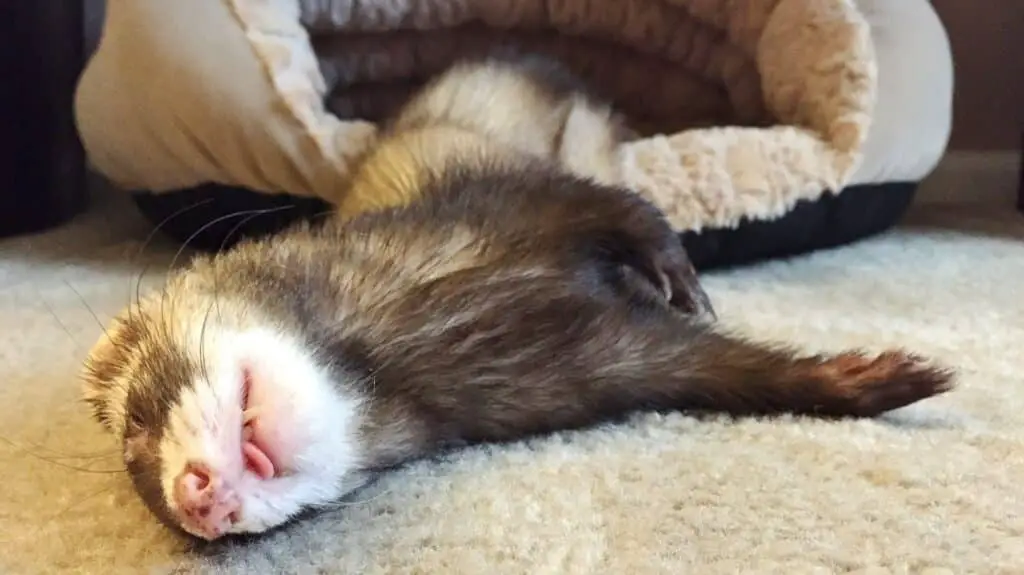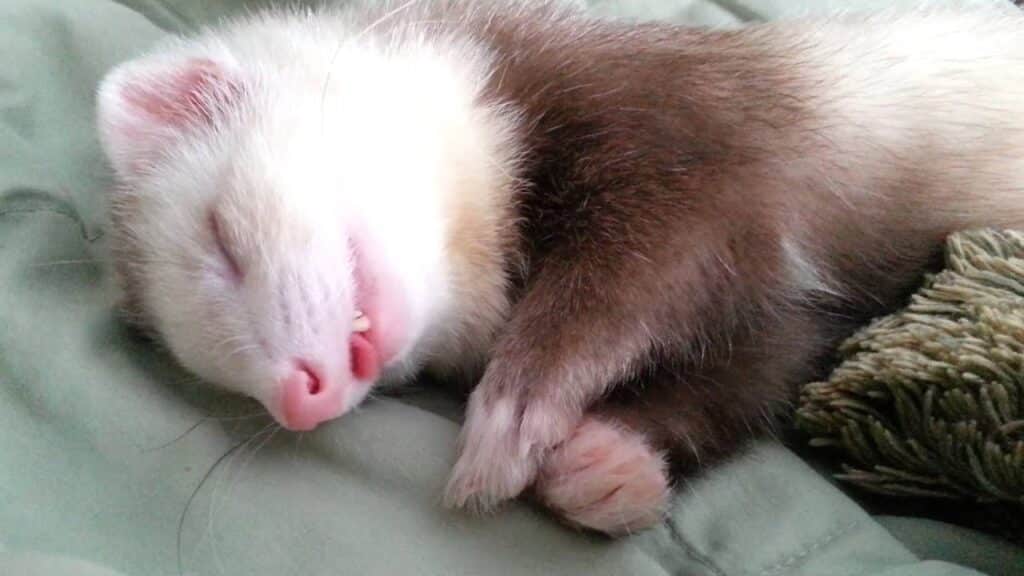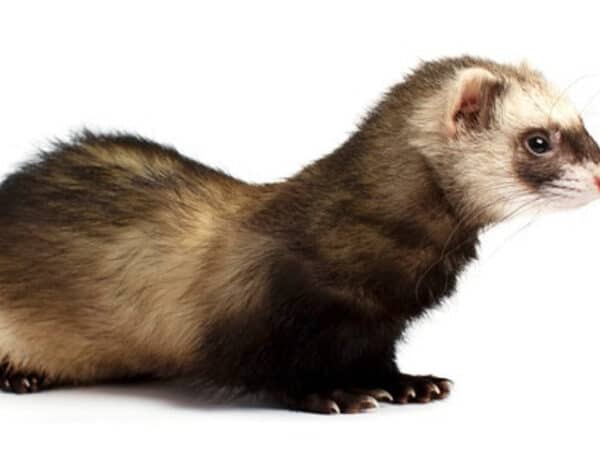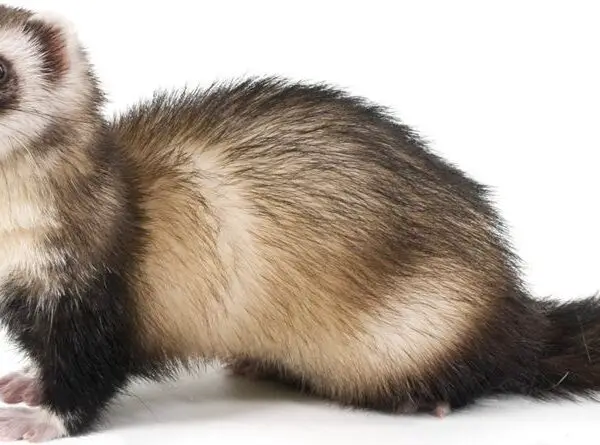Introduction
Do Ferrets Sleep A Lot: Ferrets, those charming and mischievous members of the mustelid family, have a reputation for being both energetic and playful. Yet, beneath their seemingly boundless enthusiasm lies a little-known fact, ferrets live are actually champion sleepers. These adorable creatures are known to spend a significant portion of their lives in a state of slumber. We will delve into the intriguing world of ferret sleep patterns, shedding light on just how much these endearing pets doze off and the fascinating reasons behind their frequent bouts of rest. So, if you’ve ever wondered whether ferrets sleep a lot, prepare to be surprised by the secrets of their snoozing habits. In the world of small, furry pets, ferrets often stand out for their dynamic and curious nature.
With their boundless energy, agile movements, and insatiable curiosity, it’s easy to assume that they are active all day long. However, the truth is that ferrets have a unique sleep pattern that might leave you questioning whether they are, in fact, nocturnal creatures. This intriguing aspect of ferret behavior isn’t just a random quirk but serves a critical purpose in their lives. Ferrets, as crepuscular animals, are most active during the dawn and dusk hours, making their sleep schedule a fascinating adaptation to their environment. Understanding the extent of their sleepiness, when they sleep the most, and why they do it can provide valuable insights into caring for these captivating companions.
So, if you’ve ever been curious about the sleep habits of these pint-sized, fur-covered adventurers, join us as we uncover the captivating world of ferret slumber and its role in their unique lifestyles. During their waking hours, ferrets are notorious for their boundless energy and playful antics. This frenetic behavior can be attributed to their extended periods of sleep, which allow them to recharge and engage in their favorite pastimes, such as burrowing, exploring, and engaging in playful wrestling matches with their fellow ferret companions.

How often should ferrets sleep?
They are curious and playful, but also sleep for about 16 hours a day. This makes them ideal pets for people with full-time jobs, as they can be left to snooze on their own for a few hours a day. Being crepuscular, this means they are usually active during dawn and dusk.
Create a Comfortable Sleep Space: Provide a cozy and quiet sleeping area for your ferret. Ferrets prefer dark, enclosed spaces like hammocks, hideaways, or specially designed ferret beds.
Routine and Social Interaction: Establish a daily routine that aligns with your ferret’s crepuscular nature. Interact with your ferret during their active periods to engage them mentally and physically.
Monitor Sleep Patterns: Keep an eye on your ferret’s sleeping habits. Significant changes in sleep patterns can be indicative of underlying health problems, and prompt veterinary care should be sought.
Balanced Diet: Ensure your ferret is receiving a proper diet, as nutritional deficiencies can affect their energy levels and overall health.
Regular Playtime: Dedicate time each day for play and exercise. This will help expend your ferret’s energy during their active hours.
Do ferrets have lazy days?
Even though ferrets can sleep up to 18 hours a day, they’re far from lazy. Ferrets are hyperactive creatures that love exploring, running, jumping, and having fun with their owners! A healthy ferret needs at least 3-4 hours of playtime daily to prevent obesity and behavior problems.
Lust like humans, ferrets have their own individual personalities and energy levels. While they are typically active and curious animals, there can be variations among individuals. Some ferrets may naturally be more energetic and active, while others might be a bit more laid-back.
Ferret kits (young ferrets) tend to be much more active and playful than adult ferrets. As ferrets age, they might have days where they are less inclined to engage in vigorous play. This could be due to the natural aging process, though it’s crucial to monitor any significant changes in activity as it might indicate health issues in older ferrets.
Environmental factors can influence a ferret’s activity levels. Ferrets are sensitive to extreme temperatures. On very hot or cold days, they might become less active to conserve energy or seek warmth. Ensuring a comfortable living environment is essential to mitigate this.
One of the most critical factors that can lead to a decrease in a ferret’s activity level is their health. If a ferret is unwell or in pain, they may appear lethargic or less active than usual. Any noticeable change in your ferret’s behavior should be taken seriously and evaluated by a veterinarian.
The routine and mental stimulation provided to a ferret can also affect their activity levels. If a ferret’s environment lacks variety and stimulation, they may become bored, leading to decreased activity. Ensuring that your ferret has plenty of toys, interaction, and a stimulating environment can help keep them active and engaged.
Do ferrets need sunlight?
Ensure the cage is placed in an area away from draughts and direct sunlight. Ferrets are highly susceptible to heatstroke as they cannot sweat, so ensure their cage is not in direct sunlight and check them regularly to ensure they do not get too hot.
Sunlight is a natural source of vitamin D, an essential nutrient for overall health. Vitamin D plays a crucial role in calcium metabolism, which is vital for maintaining strong bones and teeth. For ferrets, just like other animals, exposure to sunlight can help them synthesize vitamin D in their skin.
Many ferret owners keep their pets primarily indoors, which can limit their exposure to natural sunlight. In such cases, it becomes important to ensure that ferrets receive an appropriate diet that includes vitamin D. Commercial ferret food is usually formulated to meet their nutritional needs, but it’s advisable to consult with a veterinarian to ensure your ferret’s diet is balanced.
While ferrets don’t require direct sunlight for extended periods as some reptiles do, they do benefit from regular play and exercise in a well-lit environment. Natural light, even when filtered through windows, provides a stimulating and visually appealing atmosphere for your ferret. This can help keep them mentally and physically active.
It’s essential to strike a balance when it comes to exposing your ferret to sunlight. Ferrets are susceptible to heatstroke and dehydration, so avoid exposing them to direct sunlight during hot weather. Always provide a shaded area where they can retreat to if they feel too warm.
Can you have just 1 ferret?
Ferrets don’t cope well living alone and should be kept in pairs or groups. You’ll often find them having an impromptu play, charging around their enclosure and springing at each other. One thing’s for certain, they always choose to snuggle together in a big pile when they sleep.
Ferrets are inherently social animals. In the wild, they live in groups or colonies, and this social nature extends to their behavior as pets. They thrive on companionship, interaction, and play with other ferrets. If you choose to have only one ferret, you become their primary source of social interaction.
Some ferrets have aggressive or dominant tendencies that make it challenging to introduce them to other ferrets. In such cases, a single ferret may be the best option.
If you have ample time and commitment to devote to a single ferret, providing them with plenty of social interaction and stimulation can help mitigate the potential drawbacks of solitary living.
Sometimes, you may rescue or adopt a single ferret that has been separated from its companions. In such cases, a solo ferret can still lead a happy and fulfilling life with proper care and attention.
Do ferrets need to eat everyday?
Your ferrets will need to feed throughout the day. This is because they have high metabolic rates which means they need to eat little and often. They’ll need to have food available at all times. It’s a good idea to encourage your ferrets to forage for their food.
Ferrets have fast metabolisms, which means they need to eat frequently throughout the day. In the wild, they are opportunistic hunters and eat several small meals daily. As a result, domestic ferrets should ideally be fed multiple times a day to mimic their natural feeding patterns.
Ferrets require a diet that is rich in animal protein and fat. High-quality commercial ferret food is specially formulated to meet these nutritional needs. It’s essential to provide your ferret with a diet designed for their species, as feeding them inappropriate foods can lead to health issues.
In addition to their food, ferrets need access to fresh, clean water at all times. Hydration is essential for their well-being, especially considering their high metabolic rate.
While the primary diet for ferrets should consist of commercial ferret food, you can offer occasional treats or snacks. These should still be high in protein and low in carbohydrates. Common ferret treats include freeze-dried meats or small pieces of cooked chicken.
While it’s crucial to meet your ferret’s nutritional needs, it’s equally important to avoid overfeeding. Obesity is a common health issue in ferrets, and it can lead to various health problems. Feeding the recommended portion sizes and monitoring your ferret’s weight is essential.
Do ferrets get sad?
Ferrets can be very emotional at times. You may be surprised to find your ferret is prone to depression. Like humans, ferrets will grieve the loss of a friend, either human or animal. Sad ferrets may spend time in areas their buddy used to frequent.
Ferrets are highly social animals and often form strong bonds with their human caregivers and other ferrets. When separated from their companions or deprived of social interaction, they can experience loneliness and sadness.
Ferrets can become stressed or anxious due to changes in their environment or routine. Moving to a new home, introduction to new ferret companions, or disruptions in their daily life can all lead to feelings of unease and sadness.
Ferrets can suffer from various health conditions, such as adrenal disease or insulinoma, which can affect their mood and behavior. Pain or discomfort from these conditions can lead to changes in their emotional state.
Ferrets, like other animals, can experience grief. The loss of a bonded companion, whether another ferret or a human caregiver, can cause sadness and mourning. Some ferrets may exhibit signs of depression or lethargy after such a loss.
Ferrets are intelligent and curious creatures. If they lack mental and physical stimulation, such as toys, playtime, or exploration opportunities, they can become bored and show signs of unhappiness.
Do ferrets ever cuddle?
Many ferrets like to snuggle with their humans. One thing you can try is getting a hoodie with a front pocket. Your furry little pal may like to curl up in there as you’re relaxing. You can also lie down on the floor with a blanket.
Ferrets are known for their lively and playful nature, often engaging in antics that keep their owners entertained. While they may not be considered traditional “cuddlers” like dogs or cats, ferrets do have their unique way of showing affection and seeking comfort.
It’s important to note that not all ferrets will exhibit the same cuddling behaviors. Each ferret has its unique personality, and some may be more inclined to cuddle than others. The age, upbringing, and socialization of the ferret can also influence their comfort with cuddling.
While ferrets can be affectionate and enjoy close contact, it’s essential to respect their boundaries. Some ferrets may not tolerate prolonged cuddling or may need space at times. Pay attention to their cues and body language to ensure they feel comfortable.
These small and playful creatures seek closeness and companionship with their human caregivers. Understanding your ferret’s individual preferences and providing opportunities for bonding and affectionate interactions can help strengthen the unique and rewarding relationship between you and your furry friend.
How often do ferrets fart?
Ferrets are quite the fart machines. They not only let ’em rip while pooping—which they do every few hours on a normal day—but they get particularly gassy when they’re stressed. The pungent smells are often news to their creators, though.
The type and quality of a ferret’s diet can significantly impact the frequency of flatulence. Ferrets are obligate carnivores, which means they primarily eat meat. Feeding them inappropriate foods, such as those high in carbohydrates or fiber, can lead to digestive issues and increased gas production.
Some ferrets may be intolerant to certain ingredients or specific types of food. Dairy products, grains, or high-fiber foods, for example, can cause gastrointestinal discomfort and increased gas in ferrets that are sensitive to them.
Overeating or consuming food too quickly can also contribute to gas in ferrets. It’s important to portion control and feed your ferret several small meals throughout the day to prevent gorging.
Chronic flatulence or changes in farting patterns can be a sign of underlying gastrointestinal problems, such as gastrointestinal infections, parasites, or inflammatory bowel disease. If you notice persistent changes in your ferret’s gas production or other digestive symptoms, consult a veterinarian.

Conclusion
These small, furry creatures are renowned for their extended periods of slumber, often dozing for up to 16 hours a day. While this might seem excessive compared to human sleep patterns, it’s entirely natural for ferrets sleep and serves crucial functions in their lives. Ferrets are crepuscular animals, meaning they are most active during dawn and dusk, which necessitates long periods of rest to recharge their high-energy lifestyles. Their rapid metabolism and ability to enter deep sleep states, like torpor, help them conserve energy for their playfulness and explorations during their waking hours. Understanding and accommodating the sleep patterns of your ferret can lead to a deeper bond and a more harmonious living arrangement.
It’s essential to provide them with a comfortable and safe environment where they can nap and play, allowing them to flourish as the energetic, curious, and charming companions they are known to be. So, while ferrets do indeed sleep a lot, these delightful creatures are a perfect reminder that there’s much more to their adorable antics than meets the eye. Embracing their unique sleep habits is just one more way to appreciate the extraordinary world of ferrets. Furthermore, ferret sleep patterns offer valuable insights into the intricacies of their biology and behavior. Their extended periods of rest demonstrate how they have adapted to their environment as crepuscular animals, aligning their activity with the natural rhythms of the day.
This adaptation has allowed them to thrive in their natural habitat and, when kept as pets, presents a delightful challenge for their owners. As ferret owners, it’s essential to strike a balance between respecting their need for sleep and providing opportunities for mental and physical stimulation during their active hours. Offering engaging toys, tunnels, and social interaction during their wakeful periods ensures they remain mentally and physically stimulated, promoting their overall well-being. It’s a reminder of the intricate ways in which animals adapt to their surroundings, and it underscores the importance of responsible pet ownership. So, as you observe your ferret’s adorable slumber, remember that it’s a key part of what makes them the endearing and enigmatic pets they are.





No Comments